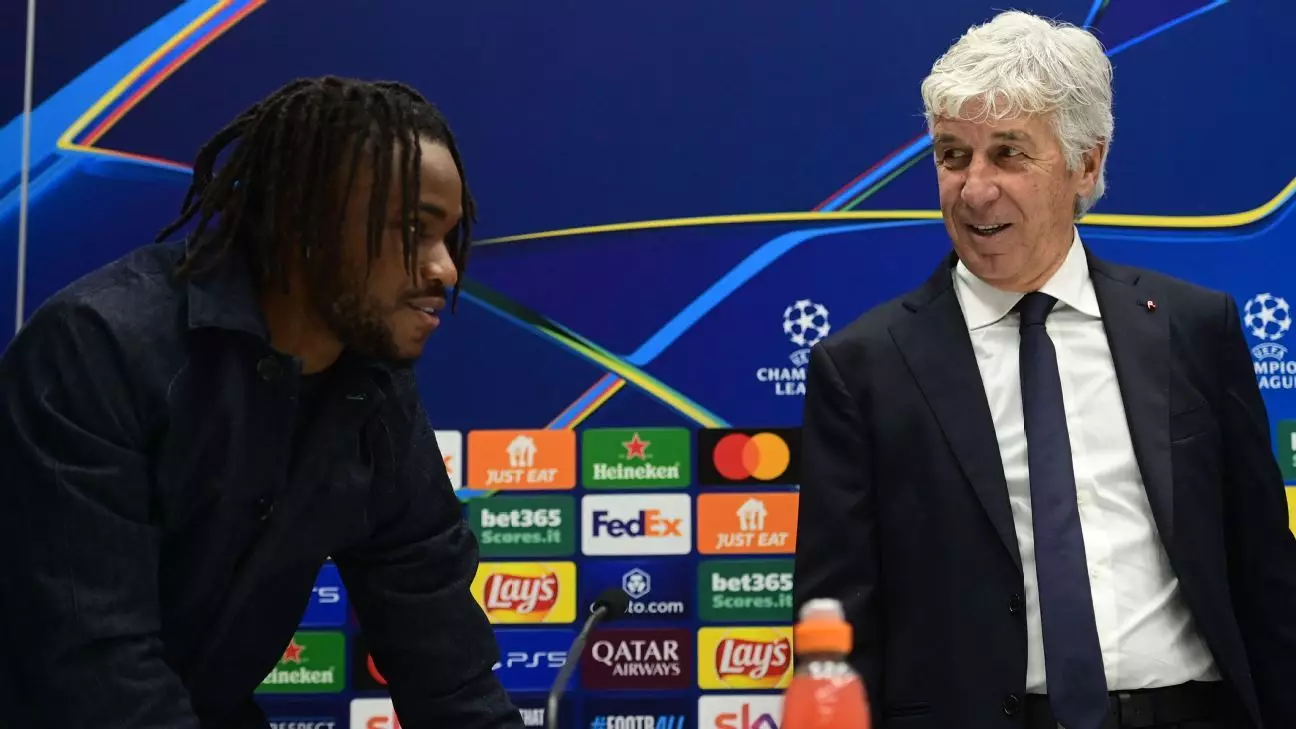In the realm of professional sports, the spotlight often shines brightest on individual players, particularly when the stakes are high like in the Champions League. This was exemplified in a recent match where Atalanta faced Club Brugge, suffering a disappointing 3-1 defeat. The fallout from this event has uncovered deeper tensions within the team, especially in the wake of Ademola Lookman’s missed penalty kick, a moment that ignited a fierce reaction from Atalanta’s coach, Gian Piero Gasperini.
Gasperini did not hold back in his assessment, labeling Lookman as “one of the worst penalty takers” he had witnessed. Such criticism naturally places tremendous weight on the player’s shoulders, as it comes from a figure of authority who is expected to cultivate a sense of unity within the team. Gasperini’s comments have highlighted not only Lookman’s perceived failures but also raised questions about the management’s approach to player accountability and motivation in the logistically and emotionally charged environment of European football.
In response to Gasperini’s outburst, Lookman’s comments reveal the emotional toll that such public scrutiny can impose on an athlete. The forward articulated his anguish on social media, condemning the nature of the criticism while also emphasizing the collective effort and dedication he puts forth for the club and its fans.
What should be noted is the gravity of Lookman’s statements, as he expressed feelings of disrespect stemming from being singled out. To be called out publicly by a coach, especially after a team loss, can shatter morale not just for him but for the whole squad. In high-pressure environments, where failure is dissected and scrutinized, the human element of sports often becomes overshadowed by statistics and performance evaluations.
Moreover, Lookman’s insistence that he acted in line with team dynamics—taking the penalty only after being instructed by the designated taker—suggests that he was not acting out of a sense of personal glory, but rather aimed at supporting his team. This raises pertinent questions about the communication and trust that exists within the squad, an essential aspect that’s often overlooked amidst the drama of individual errors.
Atalanta captain Rafael Tolói also fell under the harsh light of Gasperini’s criticism after receiving a red card for an ill-tempered incident during the match. The juxtaposition of Gasperini’s remarks towards both players underscores a potentially toxic environment where leaders take to reprimanding players publicly rather than fostering a nurturing atmosphere conducive to growth.
This incident encapsulates a broader issue within sports management: the delicate balance between accountability and nurturing. Coaches must judiciously choose their words, recognizing that public criticism, particularly in the wake of a defeat, can exacerbate a player’s mental and emotional state. Instead of emphasizing individual failures, a more constructive approach that fosters collective responsibility and resilience may serve a team better in times of adversity.
In professional football, the journey from despair to redemption is a familiar narrative. Lookman’s assertion that “life’s about challenges and turning pain into power” is crucial not only for his personal growth but also for the fabric of team spirit at Atalanta. While disappointing results can forge a divide, they also present an opportunity for reflection, camaraderie, and unity.
Gasperini’s comments may sting now, leaving lasting impressions on Lookman and his teammates, but it is how they collectively respond to this adversity that will determine their future successes. As they navigate the rocky terrain of competition, the commitment of both players and coaches to support one another could lay the groundwork for a more resilient and formidable Atalanta side, ready to tackle next challenges head-on.
The dialogue surrounding Lookman’s penalty kick is not merely about a missed opportunity in a match; it is a compelling reminder of the importance of mutual respect, empathy, and constructive criticism within sports. As Atalanta moves on from this experience, embracing challenges as learning opportunities may ultimately shape them not just as a team but as a community.

